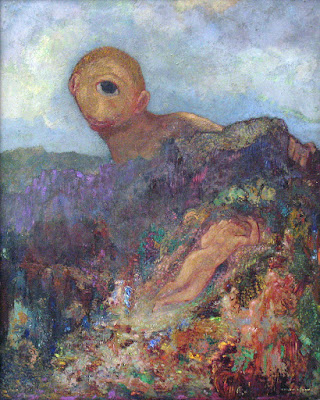Facebook, Frankenstein, and the Problem with Giants
 |
| Cover illustration, "A Modern Monster" by Craig & Karl, 2018, Science, Vol. 359, Issue 6372 |
It’s been 200 years since Mary Shelley‘s Frankenstein was written, and the monster lives on in the form of Frankenbook. The mess we are in with Facebook right now is not unlike the mess we are in with so many things too big to fail: a hyper-speed confrontation between the forces of creation and destruction, and the misshapen Giants born from that union.
Both Frankenstein and Facebook had a youthful aura of “protest” attending their birth, protest against perceived dehumanization, and protest against power structures through which information was available. Both were adolescent hedges against the abyss of non-being -- Frankenstein with his scavenged body parts, dead and yet vitalized for eternity, and Facebook with its one-eyed romantic notion of democratization of information and manifesto of open and limitless benign growth and connectivity.
The parallel between Facebook and Frankenstein is a bit creepier when one considers that Facebook, as Zuckerberg repeated over and over during his testimony to the U.S. Congress, was born "in my dorm room" -- but what wasn't said is that the eldest child born in that dorm room was FaceMash, a website set up as a "hot or not" sport for Harvard students where visitors to the site could compare two female student pictures side-by-side and vote on who was hot, or not. Harvard eventually put the squash on the Mash and it was aborted. But it spawned Facebook.
Stupid and juvenile? Yes. That Facebook is still in its adolescence, and thus subject to the sin of hubris goes without saying, just as all creative endeavors are subject to the rush and enthusiasm of hubris. How else would anyone have the courage to create without stealing a little Promethean fire from the gods? Dr. Frankenstein may be forgiven. And perhaps Facebook too, at least at the start. Like adolescents, both failed to foresee how quickly the creation might outstrip the creator and become destructive and manipulative.
Celebrating all things 'Franken', in the recent edition of Science, Henk van den Belt suggests that Dr. Frankenstein’s moral transgression was not that he undertook the hubristic attempt to create a human being, but rather that once it worked, he fled from his unsightly creation, leaving it without parental supervision or loving care. Left to fend for itself, the monster sought friendship and companionship from others, but again and again encountered rejection. Only then did it become intent on avenging the injustices done to him.
And it's true that the monster Frankenstein often asked wistfully of others, "Friend?" But no one 'Liked' him. Today he would be cyberbullied on Facebook in a nanosecond -- no need for self-exile into the arctic snow-melt. For all its talk of openness, Facebook often functions, as do all cultic and tribal rituals, to lock-in collective norms. One must be 'liked' on Facebook or risk social, and then psychological death.
Scientists tend to find the focus on Franken hubris unhelpful, and I agree --it's in the nature of creating to become identified with one's creation. But it's also in the nature of creating that hubris becomes tempered by the suffering of limitation. The gods of creation and the gods of destruction are often one and the same. So it would have been very fitting for Congress to have eaten at least a nice chunk of Zuckerberg's liver. But Zuckerberg was not chained to a rock, and no eagle came to nibble at his innards.
After the hearings Facebook stock price went up.
So here the parallel between Frankenstein and Facebook ends, because Facebook was always in the business of business, and as a society we are unwilling to face that and what it implies.
The idea that entities like Facebook will be subjected -- or subject themselves -- to modulation, supervision, humility, or government regulation is almost laughable right now. The mega-media corporation is here and growing, spawning trolls, disinformation, and eating everything in its path. For example, in a taste of what's coming, Rolling Stone's, Matt Taibbi reported that "Facebook applied for (and received last year) a patent for a tool called Techniques, for emotion detection and content delivery. It would use the camera in your phone to take pictures of you as you scroll through content. Facebook would then use facial analysis to measure how much you did or did not like the content in question, so as to determine what kind of stuff to send your way."
That's the problem with Giants. They don't behave well by themselves.
In world mythologies giants are depicted as essentially chaotic creatures, blundering, often very short-sighted, and subject to titanic, usually destructive emotions. They have to be dominated, controlled, even tricked by humans into doing what we want them to do. They have their place in the creative process: many a medieval legend tells of a saint who outwits a giant, and gets it to build an enormous cathedral.
Most interesting, is that in mythic tales, the creation of giants often preceded that of humankind, and in many mythologies they are considered to be abortive attempts at creation. The Creator didn’t get it quite right. But its hard to get rid of the giants and they linger in the world — creating destructive upheavals unless we watch what they're up to very closely and get a jump on them, which means setting limits on our own propensity for greed, distraction, and destruction.
 |
| Le Cyclope, Odilon Redon, 1914, Kroller Muller Museum |
 |
| The Rhinegold & the Valkyrie, Arthur Rackham, 1910 |
 |
| Trolls, John Bauer, 1915 |


Comments
Post a Comment